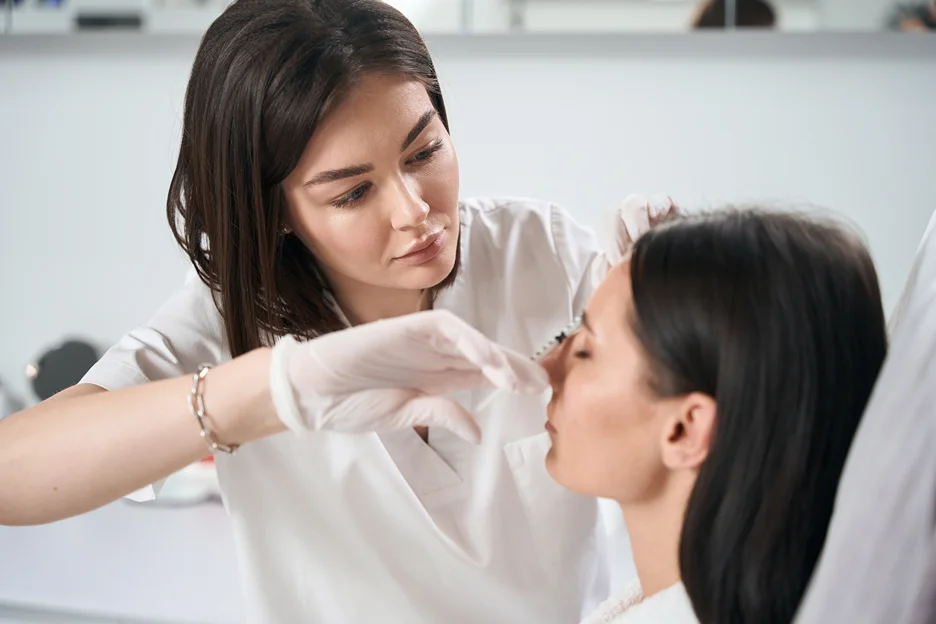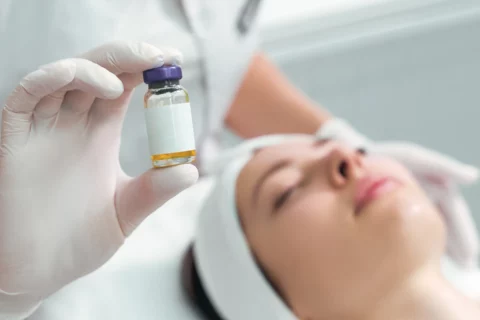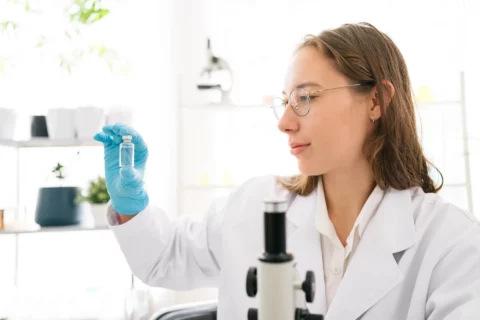Regenerative aesthetics, led by exosomes, offers innovative solutions in aesthetic medicine by harnessing the body’s healing. This guide provides aesthetic professionals with a clear, actionable understanding of exosome application for challenging skin concerns like scarring, pigmentation, and chronic inflammation.
Understanding Exosomes: The Future of Cell-Free Therapy
Exosomes are nanoscale extracellular vesicles that function as crucial messengers between cells. They contain a rich cargo of proteins, lipids, and nucleic acids, which they transport to target cells to modulate their function
Derived from sources like mesenchymal stem cells (MSCs), exosomes offer the regenerative benefits of stem cell therapy without the associated risks. Because they are cell-free, they possess low immunogenicity and toxicity, eliminating the risks of immune rejection and tumorigenesis associated with using live cells. This makes them a remarkably stable and biocompatible tool for advanced dermatological treatment.
The Core Mechanisms: How Exosomes Drive Skin Regeneration

Exosomes exert their therapeutic effects by orchestrating three fundamental processes in the skin:
- Inflammation Modulation: Chronic inflammation is a key driver of skin aging, pigmentation, and poor wound healing. Exosomes can deliver anti-inflammatory cytokines and regulate immune cell activity, calming persistent inflammation and creating a balanced environment for tissue repair.
- Extracellular Matrix (ECM) Remodeling: The health of the ECM—the structural network of collagen and elastin—is critical for skin firmness and texture. Exosomes stimulate fibroblasts to produce new Type I collagen and elastin while down regulating enzymes that degrade the ECM, effectively rebuilding and rejuvenating the skin’s foundation.
- Cellular Regulation and Repair: Through a process called paracrine signaling, exosomes influence cell proliferation, migration, and apoptosis (programmed cell death). They can accelerate wound closure, protect cells from oxidative stress, and promote the healthy turnover of skin cells.
Advanced Clinical Application: Scar Revision
Optimizing wound healing is essential for preventing and revising scars. Exosomes have demonstrated a remarkable ability to improve all phases of the healing process—from inflammation and proliferation to final remodeling.
Studies show that exosomes derived from adipose stem cells (ADSC-exos) play a dual role in scar management. In the initial stages of wound healing, they promote the synthesis of collagen I/III to accelerate closure.
Critically, they also inhibit excessive collagen deposition during the later remodeling phase, which helps prevent the formation of hypertrophic scars and keloids. By regulating key signaling pathways like Wnt/β-catenin and PI3K/Akt, exosomes enhance cell migration and proliferation, leading to faster healing with significantly attenuated scar formation.
A split-face clinical trial involving patients with acne scars found that combining exosome application with fractional CO2 laser treatments resulted in less post-procedure redness and a significant improvement in scar appearance compared to laser therapy alone.
Advanced Clinical Application: Pigmentation Disorders
Hyperpigmentation, including melasma and post-inflammatory hyperpigmentation (PIH), results from the overproduction of melanin. Exosomes offer a sophisticated method for regulating this process.
Research indicates that exosomes can modulate melanogenesis by down-regulating the genes and signaling pathways responsible for melanin production, such as PI3K/AKT and MAPK/ERK.
They effectively reduce the activity of melanocytes, the cells that produce melanin, to restore a more even skin tone. Furthermore, the anti-inflammatory and antioxidant properties of exosomes combat two other major contributors to pigmentation: inflammation and oxidative stress. By neutralizing reactive oxygen species and supporting the ECM, they not only correct existing discoloration but also improve overall skin clarity, texture, and radiance, making them an excellent therapy for dull skin.
Advanced Clinical Application: Inflammatory Skin Conditions
For patients with chronic inflammatory conditions like atopic dermatitis or rosacea, exosomes offer a promising therapeutic avenue. Their primary benefit lies in their profound ability to modulate the skin’s inflammatory response.
Exosomes can help restore a healthy skin barrier and reduce the persistent inflammation that characterizes these conditions. By delivering calming signals and regulating immune function, they can alleviate symptoms and improve the skin’s resilience against environmental triggers.
While more clinical research is needed, the foundational science strongly supports their use as an adjunct therapy for managing complex inflammatory skin diseases.
Enhancing Efficacy: Synergistic Treatments in Your Practice
To maximize the clinical benefits of exosomes, their delivery into the dermal layers must be optimized. Combining topical exosome application with procedures that create micro-channels in the skin is a highly effective strategy.
Microneedling, for instance, creates controlled micro-injuries that trigger a natural wound-healing response while also allowing exosomes to penetrate deeper into the skin where they can directly interact with target cells like fibroblasts.
This synergy amplifies their regenerative effects, leading to superior results in skin rejuvenation, scar revision, and pigmentation correction. Similarly, following fractional laser treatments with exosome application can accelerate healing, reduce downtime, and enhance treatment outcomes.
Integrating Exosomes into Your Practice

Offering advanced exosome therapies positions your practice at the cutting edge of aesthetic medicine. It allows you to provide versatile, non-invasive, and highly customizable treatments that deliver lasting, visible results.
By addressing the root causes of skin concerns at a cellular level, you can achieve a higher level of patient satisfaction and build a reputation for delivering sophisticated, science-backed care. This translates directly to a stronger return on investment and sets your practice apart in a competitive market.
Exosomes are more than just a trend; they are a foundational tool in the future of regenerative dermatology. Their ability to safely and effectively revise scars, correct pigmentation, and calm inflammation makes them an invaluable asset for any aesthetic practice committed to excellence.
Ready to partner with a leader in affordable excellence? Face Med Store is your trusted supplier for high-quality exosome products and other aesthetic essentials. Explore our solutions today to bring the power of regenerative medicine to your patients.






